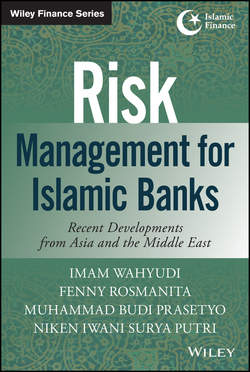Читать книгу Risk Management for Islamic Banks - Imam Wahyudi - Страница 11
На сайте Литреса книга снята с продажи.
Part One
Introduction
Chapter 1
Principles of the Islamic Financial System
Principles of Islamic Finance
ОглавлениеRisk sharing as a principle of justice is embodied in Islamic economy. Every economic agent involved in financial transactions, consciously or unconsciously, directly or indirectly, should complement each other and the system. All parties, without exception, can access money and other resources in the economy. The result is a “multiplier effect” that appears to drive the economy and improve the welfare of the community, not just the individual. All of these are summarized into three Islamic finance principles: universal complementarity, justice and equity in al-hisba, and abolition of riba.
Universal Complementarity
Both conventional and Islamic financial institutions function with the purpose of creating a system to enhance the efficiency of resource allocation and distribution in society by providing financial services to bridge the gap between the parties with excess funds on hand and those needing funds, thus setting in motion continuous economic growth. The basic difference between the two is that an Islamic financial institution must be free from all forms of usury, gambling (maysir), uncertain or doubtful elements (gharar), swindling (tadlis), injustice and coercion (ikhraha). Islamic financial institutions divide risk and profit fairly between different economic actors, both when there is a surplus of funds as well as when there is a deficit of them. This division of risk is a manifestation of the principle of economic fairness and implemented among the participants in the profit–loss sharing scheme. Every economic agent involved in a financial transaction, aware or not, directly or indirectly, should complement each other's absence of skill or function. Thus, everyone, without exception, can access the money in circulation and the available resource. Of course the multiplier effect that can be generated will mobilize the economy and improve the society's prosperity, not just the individual ones. When every element in the society is considered as an economic agent (producers and consumers, government, households, and industry) with complementary functions needed to achieve societal prosperity, the loss of individual business opportunity is a loss to society.
Justice and Equity in Al-Hisba
Among Islamic financial contract schemes, the profit-sharing instrument is considered to be most representative of Islamic finance's character. This scheme is dependent on the proportion (nisbah) agreed upon, based on the comparison between the opportunity cost of capital and the expectations of profit or loss of business. In Islamic finance, pricing is not determined by conventional standards (e.g., the capital asset pricing model [CAPM], market interest rate, etc.), but from the comparison of the function of satisfaction of capital to individual satisfaction and, on an aggregate level, a comparison to the economic surplus of every economic agent.
Abolition of Riba
Other than the two principles, there is at least another that must hold in the implementation of Islamic finance; the principle of removal of usury (riba). It must be understood that the marginal rates of substitution will be different among economic agents. This difference should be reflected in the lack of a “unified interest rate” as a reference for opportunity cost. In the allocation of return, it should be based on the division of investment roles along with the risk distributed among them. With that, every business opportunity will have a unique rate of return. In the end, this practice will consistently move in the direction of the removal of usury, which is the removal of a predetermined rate of interest between economic agents. In other words, economic agents will share risks and returns based on the actual performance of an investment. Aside from the way that usury is a form of injustice and is as such unlawful in Islam, the removal of usury is an implementation of the principle of fairness in measurement or scales. Every economic agent receives a different return according to their own measure, dependent on the investment role and risk that they've taken.
